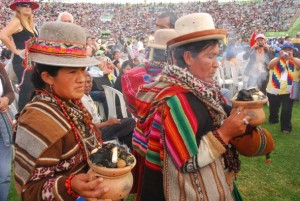Cochabamba hosts World Summit on Climate Change and Mother Earth

The Brothers in Bolivia have been participating in the World Summit on Climate Change and Mother Earth which was held in Cochabamba in the last days of April. Up to 20,000 people from around the world gathered to discuss the causes and effects of climate change and to draft a document which would outline a way forward after the failure of the Copenhagen COP15 conference late last year. As well as listening to renowned speakers, the main work was carried out in 17 working groups which examined various aspects of the issue of climate change. Our specific interests were how climate change is currently affecting Bolivia and affecting children and what effects it will have in the future.
Among the effects of climate change being experienced in Bolivia right now is the transformation of the landscape with the melting of Andean glaciers which are the source of much of our water. This is impacting on the availability of drinking water as well as water for irrigation and small scale crop production. The drought is driving families from the land into the cities.
This forced climate migration is likely to become a world phenomenon in the future. The recent earthquake in Haiti, though not related to climate change, reveals what may happen when changed weather conditions impact countries with poor infrastructure. Climate refugees will necessarily include millions of children from developing nations, those who will first experience the effects of a changing world climate.
As the developed world prepares itself to cope with climate change while at the same time maintaining its current consumption levels, it needs to secure sources of fuel and food for the future. Crops for the production of biofuels are now taking significant farming land in Latin America, leaving less for the needs of the local campesino population. Land is also being bought up by multinationals to secure food production for the developed world.
Bolivians already know that few countries are willing to allow them in. An increasing fortress mentality in the EU and the militarizisation of US borders leaves Bolivians with few choices. We are being warned of a new kind of apartheid in the near future islands of survival for those who can afford it and a wall of exclusion to keep the rest out.
In Andean spirituality the Pachamama (Mother Earth) is an intimate part of all life. Aymara and Quechua people have traditionally maintained a very close relationship with the Earth, with the rhythm of the seasons and with the other beings who live on the planet. The last few decades have seen the impact of other cultures and a predatory and exploitative capitalism has taken root. Facing the impact of climate change today, many are looking to their cultural roots to find meaning and inspiration.
One speaker in Cochabamba spoke of current global warming as ‘the greatest crisis that humanity has ever faced’. The importance of the COP16 conference to be held in Cancun, Mexico later in the year was stressed. What will replace the Kyoto Protocol? How can countries be obliged to meet the agreed targets or even to sign the final document? What might be the consequences for the future of all the children if the developed nations of the world fail to take this issue seriously?
article contributed by Br Juan Casey cfc



 13 May 2010
13 May 2010 







No comments yet... Be the first to leave a reply!